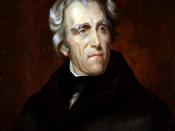Jacksonian Democracy
During the period of Jackson's presidency and several years after his presidency, the power which had once been centralized in rich southern planters and northern merchants now shifted down to the lower and middle class white males. The visual gap in appearance between the two extremes was also becoming less visible. These ideas of equality, however, were not spread universally among all people's residing in United States. The oppression of black slaves, Indians, and sometimes other whites such as immigrants still existed despite the growing ideas of equality. Jacksonian Democrats were one-sided in their ideas of political democracy, equal opportunity, and personal liberty; siding towards white males.
By 1825 almost all white males could vote, regardless of their ownership of property. This contributes to the idea of equality. Now that everyone could vote, it re-distributed the power from the rich and balanced it out with the poor.
Also, voting caucuses were being replaced by nomination conventions. Thus further destroying the unequal distribution of political power.
Despite all of these movements toward universal male suffrage, was still only toward white males. Indians as well as blacks still found themselves in the same situation as they had been before. In fact, the Indians were slowly being pushed out of their land by key pieces of legislation and rulings in the court. Free black oppression was still very present in the North despite movements for abolition. Northerners were often more harsh and prejudice to the blacks than the Southern planters. Jackson did not press for abolition, and in fact he refused to enact a ruling by the courts in favor of the Indians.
Democrats tried to promote political democracy by stretching out a seemingly friendly hand to voters, yet once again denying the rights of blacks and Indians.



Essay about Jacksonians Presidency and what A Jacksonian Democracy is (timed essay
An interesting piece of work.
you say "HE refused to enact a ruling by the courts in favor of the indians" it would have been nice to let us know what this ruling was.
4 out of 4 people found this comment useful.